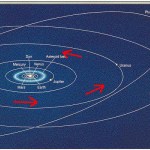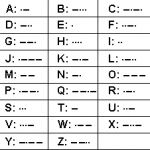angular momentum
"Galileo got it wrong. The Earth does not revolve around the Sun. It revolves around you and has been doing so for decades. At least, this is the model you are using." -Srikumar Rao
It's the end of the week, so that means its time to take on another one of your questions from the question/suggestion box, and continue our ongoing Ask Ethan series! Even though there's a backlog of hundreds of questions, you should keep sending the new ones in, as all questions are fair game for any segment. This week's question comes from reader Brian Mucha, who asks us:
Where did the sun and planets get their…
"As seismologists gained more experience from earthquake records, it became obvious that the problem could not be reduced to a single peak acceleration. In fact, a full frequency of vibrations occurs." -Charles Francis Richter
You've all been around long enough to be familiar with the severe damage that earthquakes can cause, rattling and cracking the ground, shaking down buildings, and creating catastrophic tsunamis tidal waves. In short, the largest ones that occur in the wrong places will cause billions of dollars worth of damage and will kill thousands of people.
Image credit: AP /…
The subject of the "spin" of the electron comes up again and again, so as pointed out in a comment, I really ought to do a post explaining what it is and how it works. As a bonus, this gives me the opportunity to do the dorkiest thing anyone has ever done with a cute-toddler video, namely this one:
(That's an early version of SteelyKid's new favorite game. I'll put a clip of the final version of the game at the end of this post.)
So, electron spin. Electrons, and all other fundamental particles, have a property known as "spin." This is an intrinsic angular momentum associated with the…
Time for another Fermi problem. There was a recent story in Science News that talked about the effects of the Chilean quakes on the Earth's rotation. The basic idea is that some ginmourmous amounts of rock moved closer to the Earth's center. Since the angular momentum of the Earth is conserved, the angular rotation rate would increase. The estimated change of the day was by about 1.26 microseconds.
Could all the cars in the USA be used to change the rotation of the Earth?
Well, I shouldn't have phrased the question that way. Of course 1 car technically is all you need to change the…
I showed this demo in class and I was surprised at how cool the students thought it was.
They actually thought it was some kind of trick. It is not a trick. Instead, this is an example of the angular momentum principle. If you want to try this yourself, I guess you are going to have to find some type of wheel. I attempted to get this to work with a small Lego wheel, but it wouldn't spin fast enough. You should be able to do this with one of those toy gyroscopes though. Anyway, here is the angular momentum principle:
Or, if you prefer it without a derivative it could be written as:…
Thanks to reader Cleon for notifying me of this video on youtube. Check it out.
First, some notes.
I am sure you noticed that the aspect ratio is incorrect (at least that was the first thing I noticed). The boys must have made a 16:9 video, but then uploaded it to youtube as a 4:3. This doesn't really affect the analysis, but I had to fix it. I used the awesome firefox plugin NetVideoHunter to download the video and then used MPEG Streamclip to resize the video.
Other than that, they did follow my suggestions for making videos. The camera doesn't move and is mostly perpendicular to the…
My friend J sent me a link to this gyrobike (http://www.thegyrobike.com/index.php). From what I can tell, it's a flywheel that you put in the front wheel of a bike. The site claims that this will help kids learn how to ride a bike.
So, what do I think? Clearly, this is a real product, but I am not so sure how effective it would be. As I mentioned in a previous post, it's not really about angular momentum that prevents you from falling over. Well, actually I didn't really say that. I referred to an excellent article on the physics of bicycles, David E. H. Jones and published in Physics…
Note: This is an old post from the time before my blog was in wordpress. I noticed there was some incoming link for this, and I never moved it over. Here it is in it's unaltered (except for this part) format.
I don't know why I even suggest a new energy source. Fusion power is only a few years away in the future (just like it as always been). This will replace any other sources of energy that we could come up with. But, I can't help myself, I need to share my idea and save the world. It's what I do. (call me a superhero is you want).
We can get all of our energy from the rotation of the…
When I was talking about balancing a stick, I mentioned the moment of inertia. Moment of inertia is different than mass, but I like to call it the "rotational mass". What does mass do? Things with larger mass are more difficult to change their motion (translational motion). A similar thing is true for the "rotational mass". Things with larger rotational mass are more difficult to change rotational motion. Here is the demo.
Demo for Moment of Inertia from Rhett Allain on Vimeo.
Why do I like this demo? First, it uses ordinary things. I consider juice boxes to be pretty ordinary.…
Maybe you have seen this trick. Basically, you hold by supporting it with two fingers from the bottom. You then move your hand around to keep it balanced while the stick is vertical. It is really not as hard as it looks. Also, there are two things that can make your job easier. Use a longer stick, or add an extra mass at the end of the stick. Here is a video of me demonstrating this. (I forgot, this also an event in the show Unbeatable Banzuke)
Balancing a Stick Demo from Rhett Allain on Vimeo.
So, how does this work? Let me start with a stick that is mostly vertical and supported by…
I saw this video on several places. It shows an astronaut playing with a CD player.
I wish I were an astronaut. I would probably not stop throwing up though. It would still be worth it. You can only throw up so much right? (I know the answer to this question). Anyway, this is a really cool demo. Look at the first CD player that is on. When the guy taps it, it doesn't rotate but rather it wobbles. This is a rather difficult concept, but I am going to try to give a reasonable explanation.
I will start with angular momentum. Angular momentum is sort of like momentum (linear momentum…
I don't need to explain that I think the Mythbusters are awesome (do I?). I just finished watching their latest episode. In it, they tested the scene from Indiana Jones and the Last Crusade where Indy puts a flag pole in another motorcycle wheel. The result in the movie is that the motorcycle goes flipping in the air. I have no problems with their test - it seems like they did a decent job. However, in the end, Adam says something to the effect:
*"Look how high that bike went. It took a lot of energy. There is no way that energy could come from this stick I shove into the wheel."*
I am…
The fun part about exploring the physics of [Fantastic Contraption](http://fantasticcontraption.com/) is coming up with new setups to test ideas. Torque is not too difficult to set up. Here is what I did:

In this setup, I have a "turning ball" with a wood stick attached to the side. I increased the length of the stick until the ball does not turn. At this point, the torque from the gravitational force on the stick is equal to the torque from the ball. I can use [Tracker Video Analysis](http://www.…
One of my students showed me this game, [Fantastic Contraption](http://fantasticcontraption.com/). The basic idea is to use a couple of different "machine" parts to build something that will move an object into a target area. Not a bad game. But what do I do when I look at a game? I think - hey! I wonder what kind of physics this "world" uses. This is very similar to [my analysis of the game Line Rider](http://scienceblogs.com/dotphysics/2008/09/the-physics-of-linerider/) except completely different.
Fantastic Contraption gives the unique opportunity to build whatever you want. This…
This has been all over my inbox since the press release came out yesterday; it's been on slashdot (thanks Brian), it's been at space.com, and there's a mediocre writeup on Universe Today. What's the big news? Black Holes don't destroy information after all!
What is this whole information thing, anyway? Take a look at all the normal stuff in the Universe: photons, protons, neutrons, and electrons, for example. They have lots of different properties each. They move around one another, they get bound and unbound from one another, they exert forces on one another, etc. They're aware of one…
To follow up on the faster than light post here, let's ask another question:
If you can make a way of transferring information that doesn't involve matter, is that information limited by the speed of light?
First off, let's go over what information is, and then we'll talk about how transferring information without matter is even possible. Information is anything that's organized in a meaningful manner. Take a look at the following three sentences:
This sentence contains some information.
Tihs scnnteee cainntos smoe imnfriatoon.
Not a imfro nimsoe mnoisn ctrnsnet sihto.
Each of the three…



